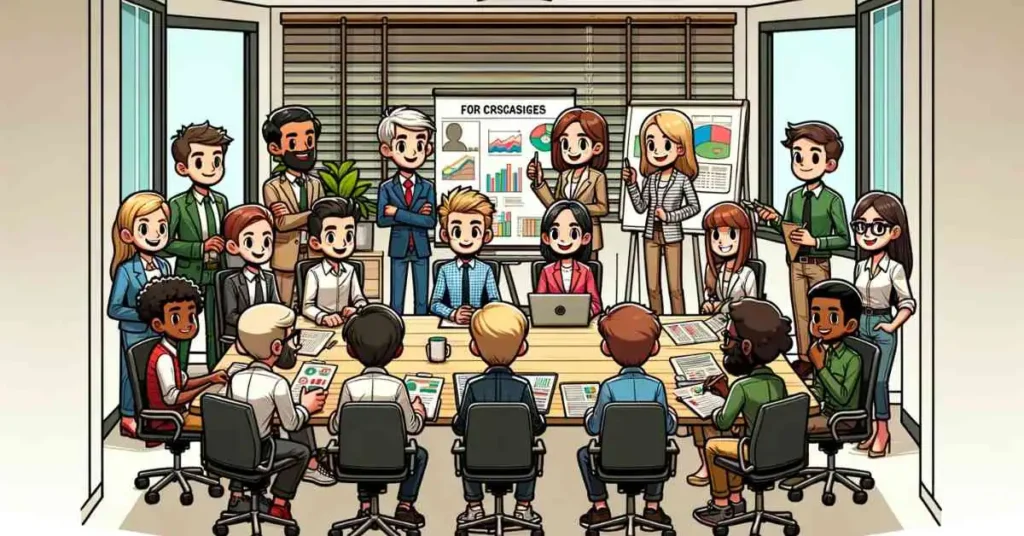Think about a busy day at work. Sometimes, we might make a mistake or misunderstand someone. It’s normal, but it’s important to say sorry the right way. Good relationships with colleagues make work better for everyone. Saying sorry shows you’re professional and you care about your team.
“Working with good people makes you good; you learn from them. It’s like playing tennis with somebody who is better than you; you improve your game.”
– Diane Von Furstenberg
This post is all about how to say sorry to a colleague. Whether you missed a meeting, forgot to do something, or had a misunderstanding, we have a sorry message for you. These messages will help you fix mistakes and keep good relationships at work. Let’s learn how to say sorry in a professional way!
You Might Also Like:
- SORRY MESSAGES FOR CLIENTS
- SORRY MESSAGES FOR NOT ATTENDING AN INTERVIEW
- SORRY MESSAGES FOR BOSS
- SORRY MESSAGES FOR REPLYING LATE
- SORRY MESSAGES FOR LATE DELIVERIES
- SORRY MESSAGES FOR MISSED APPOINTMENTS
Apologies for Mistakes and Errors

When you make a mistake at work that affects your colleagues, clients, or the workflow, it’s important to say sorry in a way that shows you mean it and that you’ll work to do better. Here are 10+ heartfelt apologies for work mistakes:
“I’m sorry for the error I made in the report. It was my mistake, and I understand it caused some confusion. I’m committed to double-checking my work in the future.”
“Please accept my apology for the mistake in the project plan. I realize it set us back a bit. I’ve taken steps to make sure it doesn’t happen again.”
“I apologize for overlooking that important detail in our client’s request. I understand the impact it had and will be more thorough in the future.”
“I’m sorry for the mix-up with the meeting times. I know it caused inconvenience, and I’ll make sure to verify all details more carefully from now on.”
“I regret the error in the data I presented. It was an oversight on my part, and I assure you of more accuracy in my work moving forward.”
“I apologize for the delay in submitting my part of the project. I understand it held up the team, and I’m putting measures in place to manage my time better.”
“My mistake in the calculations was unintentional, but I understand its seriousness. I’m sorry and commit to being more diligent in my work.”
“I’m sorry for any confusion caused by the incorrect information I shared in the meeting. I’ll ensure to cross-check all facts in the future.”
“I apologize for the error that occurred under my responsibility. I recognize the issues it caused and am working on strategies to prevent such mistakes.”
“I regret the oversight in our client’s specifications. It was my error, and I am sorry for any trouble it caused. I’ve taken steps to improve my attention to detail.”
“I’m sorry for the inaccuracies in the inventory count. I understand this created extra work for the team, and I’m committed to ensuring it doesn’t happen again.”
In these apologies, it’s important to express genuine regret, acknowledge how the mistake affected others, and show that you’re taking responsibility to avoid similar issues in the future. This approach helps maintain Professionalism and trust with your colleagues and clients.
Apologies for Misunderstandings and Communication Issues

Misunderstandings and communication issues at work can lead to conflicts or slow things down. Saying sorry in these situations shows that you want to make things right. Here are 10+ apologies for when there’s a mix-up in communication:
“I apologize for the misunderstanding in our last meeting. I realize now my points weren’t clear. I’m sorry for any confusion and will work on communicating more clearly.”
“I’m sorry for any miscommunication on my part that led to the recent issue. I understand it caused some frustration, and I commit to being more precise in my instructions in the future.”
“I regret the misunderstanding regarding the project deadline. It was a lapse in communication from my side. I’ll make sure to convey information more accurately from now on.”
“I apologize for not communicating my ideas effectively in the presentation. I understand it might have caused some confusion, and I’ll work on improving my presentation skills.”
“I’m sorry for the unclear email that led to a delay in our process. I realize the importance of clear communication and will be more thorough in the future.”
“I apologize for any confusion caused during the team discussion. I could have been clearer in my explanations, and I’ll strive to ensure better understanding moving forward.”
“I regret not communicating the changes in the project more effectively. It was my responsibility, and I’m sorry for any inconvenience caused to the team.”
“I’m sorry for the miscommunication that led to our client’s order error. I take full responsibility and will work on enhancing my communication skills.”
“I apologize for any confusion caused by my lack of clarity in the instructions. I understand it might have led to inefficiency, and I will be more explicit in the future.”
“I’m sorry for not being clear in my communication, which resulted in a misunderstanding. I’ll make sure to express my thoughts more clearly to avoid such situations.”
“I apologize for the mix-up that resulted from my unclear email. I realize it caused some extra work, and I’ll be more precise in my communication.”
In these apologies, it’s important to acknowledge your part in the communication breakdown, express regret for any issues caused, and show that you’re committed to improving your communication skills. This approach helps build better relationships with your colleagues.
Apologies for Delays and Missed Deadlines

Delays and missed deadlines can disrupt work and affect colleagues. A sincere apology can help smooth things over if you find yourself in this situation. Here are 10+ apologies for when you’re behind schedule:
“I apologize for missing the project deadline. I underestimated the time needed. I’m sorry for any inconvenience this caused and am working to complete it as soon as possible.”
“I’m sorry for the delay in submitting my report. I encountered some unforeseen issues. I understand the impact this has had and am doing my best to rectify it quickly.”
“I regret not finishing the task on time. My workload was heavier than anticipated, which caused the delay. I’m sorry for any disruption and am focusing on completing it now.”
“I apologize for not meeting the deadline we agreed upon. I ran into some challenges that slowed me down. I know the inconvenience caused and am committed to making up for lost time.”
“I’m sorry for the delay in getting back to you with the needed information. I should have managed my time better. I realize this may have caused some setbacks.”
“I apologize for falling behind schedule on our project. I miscalculated the time needed for certain tasks. I’m sorry for any complications this has caused for the team.”
“I regret that I couldn’t complete my part of the project on time. Unexpected personal matters took up more of my time than I thought. I’m sorry for any inconvenience.”
“I’m sorry for any problems my delay in responding to your emails may have caused. I was dealing with other urgent matters, but I should have communicated better about the delay.”
“I apologize for missing our agreed deadline. I encountered some technical issues that I didn’t anticipate. I understand the impact and am working to resolve it promptly.”
“I’m sorry for the delay in completing the revisions you requested. I underestimated the scope of the changes. I’m doing my best to finish them as quickly as possible.”
“I regret not adhering to the timeline we set. I had competing priorities, which I could have managed better. I’m sorry for any challenges this caused and am addressing them now.”
In these apologies, it’s important to recognize the effect of your delay, be honest about why it happened without making excuses, and express your regret for any trouble caused. This helps maintain Professionalism and trust with your colleagues.
Reaffirming Commitment to Teamwork and Collaboration

Working well with others is key in any job. It’s about helping each other and achieving goals together. If there’s been a problem, it’s good to show you’re still dedicated to your team. Here are some ways to say this:
“I value our Teamwork and collaboration greatly. I’m committed to working together effectively and supporting our shared success.”
“Teamwork is the heart of our success, and I apologize for any recent issues. I am dedicated to collaborating more effectively with all of you.”
“I understand the importance of working together. I am committed to contributing positively to our team and supporting our collective goals.”
“Effective Teamwork is crucial, and I’m sorry for any actions that may have hindered this. Moving forward, I’m focused on being a supportive and collaborative team member.”
“I believe strongly in the power of collaboration. Despite any recent setbacks, I am dedicated to working together for the betterment of our team.”
“Teamwork makes us stronger, and I apologize for any lapses on my part. I am committed to enhancing our collaboration and mutual support in the workplace.”
“A good team is built on mutual support, and I am dedicated to being a reliable and positive contributor to our team’s success.”
“Our collective effort is what drives success. I am committed to being an active and supportive part of our team, working together to achieve our goals.”
“I recognize the importance of working cohesively as a team. I apologize for any shortcomings and am dedicated to improving our Teamwork and collaboration.”
“Being part of this team is important to me. I am committed to learning from recent experiences and contributing more effectively to our group efforts.”
These messages show that you understand how important it is to work well together. They also show your commitment to being a good team player and helping the team succeed.
Offering Assistance and Support

Offering help and support to your colleagues is a great way to build a strong, collaborative work environment. Here are some ways to express your willingness to assist and support your team:
“I’m always here to offer assistance and support to my colleagues. If you ever need help or guidance, don’t hesitate to reach out to me.”
“I believe in working together and supporting each other. I’m committed to being available to help and contribute to our team’s success.”
“I’m more than willing to provide any assistance or support you may need in your work. Let’s collaborate to achieve the best results.”
“If you ever need help or guidance, please know I’m here to support you. Together, we can overcome challenges and reach our goals.”
“I’m dedicated to not just my success but also my colleagues. I’m always here to lend a hand or provide support whenever it’s needed.”
“I believe that when one of us succeeds, we all succeed. I’m committed to providing assistance and support to help our team thrive.”
“I’m here to support my colleagues in any way I can. Whether you need assistance with a project or just someone to brainstorm with, I’m available.”
“Helping each other is key to our team’s success. I’m always ready to offer my assistance and support to ensure we all succeed.”
“I’m committed to a collaborative approach at work. If you need assistance or have any questions, feel free to ask. We’re stronger when we work together.”
“I value our team’s success and am willing to offer my support and assistance to my colleagues. Let’s work together to achieve great things.”
These messages show that you’re a team player and that you’re ready to help your colleagues. Your assistance and support can strengthen your work relationships and create a positive and collaborative atmosphere.
Maintaining Open Communication and Addressing Concerns

Good communication in the workplace is key. It helps everyone feel heard and solves problems faster. Here are some ways to encourage open communication and show you’re ready to listen and help with any concerns:
“I believe in keeping communication open. Please feel free to raise any concerns or issues with me, and let’s work together to find solutions.”
“I encourage everyone to speak up and share their thoughts. I’m always willing to listen and understand so that we can tackle challenges as a team.”
“Open communication is crucial for our success. If you have any concerns, know that my door is always open, and I’m ready to help address them.”
“I value honest and open dialogue. Please don’t hesitate to bring up any issues – together, we can find the best ways to move forward.”
“Let’s maintain clear communication in our team. If there are any concerns or problems, I’m here to listen and work with you to resolve them.”
“I encourage each of you to share your concerns openly. I’m committed to understanding and addressing issues to ensure we succeed.”
“Open communication leads to better Teamwork. Feel free to voice any concerns, and I will listen attentively so we can solve any problems together.”
“I’m a firm believer in the power of communication. If there are any challenges or concerns, let’s discuss them openly and find solutions.”
“Your thoughts and concerns are important. Let’s keep the lines of communication open so we can address any issues promptly and effectively.”
“I’m here to support open and constructive communication. If you have any concerns, please share them with me, and let’s work together to find solutions.”
Encouraging your colleagues to talk about their concerns and assuring them you’ll listen and help shows that you care about a healthy and productive work environment. Open communication makes it easier to solve problems and work well together.
Closing Notes

Being friendly, respectful, and professional at work is super important. Sometimes, we make mistakes or get our wires crossed. It’s okay – what matters is saying sorry in the right way. This helps us all get along better at work.
We’ve shared lots of sorry messages for colleagues. These messages are all about how to apologize properly at work. They can help fix mistakes and make things clear with your coworkers.
Thanks for checking out these sorry messages! We hope they’re useful if you ever need to say sorry at work. Remember, how we say sorry can help keep work a friendly and smooth place for everyone.









